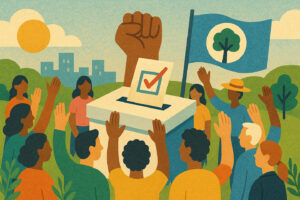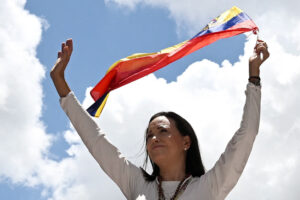
The SNF Agora Institute has released a new report by SNF Agora Fellow Scott Warren and co-author Soheila Comninos, outlining common causes of democratic erosion and offering ideas to renew public trust in democracy. The report focuses on a truly global approach to the effort. The report draws on the co-authors’ interviews with more than 40 individuals and organizations across Africa, Latin America, Asia, and Europe, identifying shared concerns and region-specific challenges. The Ford Foundation supported the report.
Warren explains, “We see erosion happening on democracy in the US, and it’s increasingly clear that there are global trends behind it as well. The US is not alone, and there’s a lot to learn from the rest of the world. We need to listen more.”
The report highlights widening inequality, unpunished corruption, and growing disinformation as factors that erode people’s trust in democratic institutions and lead them to seek undemocratic alternatives. Polarization exacerbates that mistrust and reduces interest in finding common ground. Warren sees that loss of faith as one of the most serious threats. “People increasingly feel that democracy is not delivering,” he said.
“These are not made-up concerns. That’s why the narratives that exploit them are so dangerous.”
The authors highlight genuine issues that governments often fail to address adequately. In several regions across Africa, high rates of youth unemployment and income inequality create lasting frustration among affected populations. In communities throughout Latin America, concerns about physical insecurity drive fear among residents. In the United States, rising inequality erodes confidence in government. Authoritarian actors exploit these real conditions to gain and keep power, and keep people divided.
Against this set of challenges, Warren describes the importance of SNF Agora’s role as a convener. The institute does not aim to launch a movement or set a rigid agenda. It creates space for others to share, reflect, and work together. The report supports this goal by helping advocates, funders, and researchers rethink their approach to democracy work.
Many current efforts fail to connect democratic principles with everyday concerns and show how democracy can improve lives. Warren argues that public messaging should “connect democracy with economic development, speak about shared values, and offer hope.”
The report outlines a theory of change with five guiding ideas:
- Participation builds engagement.
- Democracy should produce tangible benefits.
- Messaging must reflect local values.
- Cooperation should come from local leadership.
- Pro-democracy work should focus on coordination rather than competition.
Warren warns that efforts to advance these ideas cannot succeed in isolation. “All of these things need to happen together.”
Warren also points to funding as a barrier. Many pro-democracy groups are competing for limited resources, discouraging collaboration. “Funders often want to hear why your group is uniquely effective,” he says. “What’s needed is a shift to ecosystem thinking that supports efforts working in concert, not in isolation.”
Comninos emphasizes this shift. “At the end of that process, we started talking less about the theory of change itself and more about the ecosystem and infrastructure, because there are just so many actors and initiatives that aren’t well coordinated,” she said. “There’s a real need to map these efforts and encourage collaboration.”
The report calls for an approach less dependent on the United States and the West generally leading pro-democracy efforts. Instead, entities and countries in the Global South, like Costa Rica, Uruguay, Taiwan, and Slovenia, can lead efforts to strengthen democracy by modeling responsive governance without the baggage of past Western interventions. Warren argues that these countries often have more credibility and flexibility to lead. Regional alliances among African, Southeast Asian, and Latin American nations can help local leaders share strategies and respond to specific challenges, such as youth unemployment or physical insecurity.
“One of the key takeaways from our consultations was the need for broad coalitions that span movements, sectors, and ideologies,” said Comninos. “When academics, artists, trade unions, and grassroots organizers come together, they’re more likely to reach broader audiences and have greater impact.”
The next phase of work will focus on refining the theory of change and identifying which strategies have momentum among funders and democracy advocates. This work will include gathering insights from political networks, local civil society leaders, and frontline activists in Global Majority countries.
The report identifies six immediate priorities:
- Map democracy narratives to identify what resonates and where gaps exist
- Build a messaging consortium with key partners
- Host a funders roundtable on long-term support
- Consult Global Majority leaders and activists to guide next steps
- Strengthen regional coordination and elevate local leadership
- Share proven approaches to defending and renewing democracy
“Democracy is not a Western concept,” Warren says. “Many of its roots are found in African tribal traditions and other global cultures. We need to center those stories to learn from others and create space for shared leadership. People want to do things differently, and don’t quite know what that means yet. And that’s okay.”
The report encourages people to stay engaged, ask better questions, and share responsibility. It does not offer all the answers, but it does provide a starting point.

